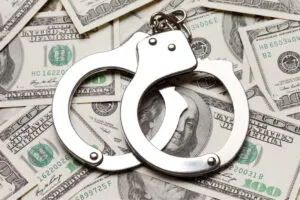California Fraud Lawyer
What Can A Fraud Lawyer From My Rights Law Do For Me?
California has multiple fraud crimes. Much of society regards fraud crimes as “white-collar” crimes. To understand the severity of fraud crimes, you must first understand what constitutes fraud. You should take fraud charges seriously because a conviction can have lasting negative impacts on your life. We break down common fraud crimes below. My Rights Law financial crimes lawyers have the skills needed to help you mount a fraud defense. Call us at (888) 702-8845 or contact us by completing our secure web form to take advantage of your free consultation today.
Forgery
Forgery is a common type of fraud crime. It occurs when you intentionally sign paperwork with another person’s name or a fake name.[1] You can also commit forgery by falsifying records, such as medical records and court documents.[2] Selling, creating, publishing, or attempting to present something counterfeit as authentic is another form of forgery. This includes slipping a fake bond statement to a clerk, cashing a counterfeit check, or submitting fake timecards.
Perjury
Perjury is another form of fraud that occurs when you lie under oath. Before you stand the take, the presiding judge will ask you to raise your right hand. Then, the judge will ask whether you swear or affirm to tell the truth, the whole, and nothing but the truth. You must swear or affirm to do so. Once you take the stand, you must comply by answering every question truthfully, regardless of the outcome. Lying while giving testimony in a criminal case is perjury.[3] Lying under deposition and declaration are also perjury. Thus, you can commit perjury outside of a courtroom setting.
The state cannot convict you of perjury when evidence depends solely on contradictory testimony from another witness.
Is This A Misdemeanor Or Felony?
Fraud is an umbrella term for various white-collar crimes, and most fraud crimes are wobble offenses. Wobbler offenses are offenses that can be misdemeanors or felonies. Perjury is always a felony offense. However, forgery is a misdemeanor offense. The particular fraud crime the state charges you with decides which penalties you may face.
What Are The Penalties?
Forgery is a misdemeanor crime, punishable by one year in county jail.[4] Perjury is a felony punishable by up to four years in state prison. However, a judge may sentence you to felony or misdemeanor probation in lieu of jail.[5]
Other penalties include:
- Fines
- Loss of employment
- Loss of some job licenses and certifications
Also consider that the federal government, through a United States Attorney, prosecutes cases of fraud in federal court. If you are convicted, you could face years in federal prison, among other consequences.
What Are My Defenses?
Now that you understand the severe penalties you face should a jury find you guilty, we want you to know which defenses are at your disposal. Of course, the defenses listed below are stated in general. For defenses that are tailored to your unique circumstances, call us at (888) 702-8882 or contact us online to take advantage of your free consultation today.
Forgery Defenses
Entrapment
Entrapment occurs when an officer forces you to do something you would not ordinarily do. You must prove that the officer did more than provide the means and opportunity for you to commit fraud. You must prove that the officer’s actions were so overwhelming that no reasonable person could say no. But how might an officer entrap you? Police have records of your criminal history. They can easily access your criminal database. A crooked officer may use this information against you.
For example, suppose an officer visits you. The officer asks you to forge a few checks and says you two can split the money. You refuse. Then, the officer gets irate, threatening to “plant evidence” against you and ensure a judge locks you up for life. The officer claims to have connections. The officer shoves a checkbook in your hands and tells you, once more, that you don’t have a choice. You’ll get hurt if you refuse. You’re scared, so you comply reluctantly. This scenario is a clear case of entrapment.
Lack Of Intent
Recall that fraud is a crime requiring intent. Prosecutors must prove that you had the criminal intention before jurors can find you guilty. Naturally, you can’t have criminal intent if you acted under duress, felt forced, or were threatened. Furthermore, you may have acted innocently and unknowingly. For example, suppose a person came to you and said she’d injured her hands so that she couldn’t write. She asked you to write her checks for her. Then, she tells you that she’s having trouble with her bank, but she’s in dire straits. She asks you to deposit the checks for her. You feel sorry for her, so you openly trust her.
As mentioned, lack of intent can occur from more frightening circumstances than innocent ignorance. Someone may put you in a bind. Suppose that a criminal tells you you’d better forge the checks, or your family would pay. This person has a gun and knows where your children go to school and where you work. Therefore, it’s a credible threat. In such an instance, you may raise the lack of intent through duress as a viable defense.
Mistaken Identity
Unfortunately, mistaking another person’s identity happens all the time. Someone confuses you with the actual perpetrator. You and the perpetrator may share similar features, but that’s no reason for you to face punishment for a crime you never committed. Proving mistaken identity can be difficult, but you can trust our expert defense lawyers to help you. We will conduct a thorough investigation to prove that you were elsewhere when the fraudulent transaction occurred. Restaurant receipts, traffic cameras, and eyewitnesses are commonly used to vouch for your innocence.
Please be aware that twins are often victims of forgery when one twin pretends to be the other. This is also true for relatives who bear similar features to other family members. Thus, your accuser may have mistaken you for your relative.
Perjury Defenses
Not A Material Fact
Judges and attorneys care about material facts, not non-material facts. A material fact is a fact that would make the defendant’s guilt more or less likely true. For example, in a case involving child abuse, the state must prove that someone willfully inflicted cruel or inhuman treatment on a minor. Thus, a material fact may be whether you heard the child scream for hours the night before you saw him with a black eye and swollen lip. However, questions that do not affect the case’s outcome are typically not material. Therefore, this may be a viable defense.
Other defenses:
- Not intentionally lying (e.g., you forgot or misremembered)
- Not under oath
Call My Rights Law’s California Fraud Lawyers Today
Remember, prosecutors are not only aggressive and looking to lock you away for as much time as possible. They’re seasoned legal experts who’re trained in making evidence stick in cases involving business fraud, wire fraud, mortgage fraud, and more. Your only chance against law enforcement looking to lock you up is to hire a legal expert of your own. A knowledgeable criminal defense lawyer:
- knows how to craft strategic defenses
- isn’t intimidated by hostile prosecutors
- knows the ins and outs of the courtroom and legal procedures
- has experience getting cases dismissed and charges dropped
- will work tirelessly to protect your freedoms
That’s My Rights Law. Call our California law office at (888) 702-8845 or contact us by filling out our secure web form to take advantage of your free consultation with an experienced lawyer today.
Other financial crimes we defend include: Blackmail
FOOTNOTES
[1] California Penal Code 470a PC
[2] California Penal Code 470d PC
[3] CALCRIM No – 2640
[4] California Penal Code 19
[5] California Penal Code 473 PC



















